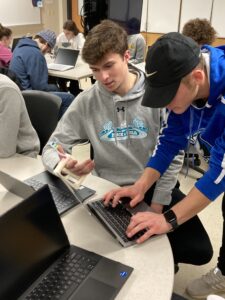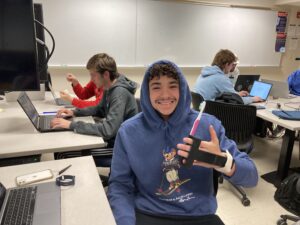During the fall semester, Elizabethtown College Engineering students were tasked with the challenge of using their computer-aided drawing (CAD) skills to design and print assistive devices to help adults with cerebral palsy perform basic tasks, like eating and brushing their teeth.
“This was one of those unique projects in that it gave us future engineers a look into what the future may look like for us and how our work and our efforts may lead to a great impact in the lives of others,” sophomore Computer Engineering major Joshua Stoner ’25 said.
This project was created through a partnership with Easterseals, a nonprofit that provides various programs and services to ensure that people with disabilities or other special needs and their families have equal opportunities to live, learn, work, and play in their communities.
This collaboration began in the spring of 2022 when Associate Professor of Engineering & Physics Dr. Brenda Read-Daily and Assistant Professor of Engineering & Physics Dr. Mark Brinton were seeking an engaging 3D printing project for the Introduction to Engineering I class and reached out to Easterseals Camp Director Amanda Silcox for help with the Community-Based Project course.
“This partnership is important because it provides a wonderful opportunity for our students to apply the ‘Educate for Service’ motto as they use their engineering skills to solve real-world problems,” Read-Daily said. “We appreciate the way that Amanda has worked with our students and encouraged them to make a difference with their engineering skills.”
In the class, students created assistive devices that users could wear on his or her hand or arm to assist with basic tasks. Some teams developed devices that could hold multiple utensil types while others focused on one particular utensil.
“Not only did I learn how to use engineering software, but I also learned how to work as a team,” first-year Civil Engineering major Jasmine Gonzalez ’26 said. “Designing the device itself was difficult, but through trial and error (and many prototypes) it was successful. This was an important lesson to learn because, in the field of engineering, we need trial and error to build a successful project. I loved the project and saw it as a huge lesson in the field of engineering.”
Read-Daily and Brinton believe challenging first-year students with projects that have a real client and purpose allows them to stretch themselves and apply their skills in new ways.
“When engineers design a new device, it’s crucial that they keep the end-user in mind, otherwise they risk making something too complicated, or something that doesn’t solve the actual problem at hand, or both,” Brinton said. “This project gave the students the opportunity to design with the user in mind. Even if they failed, it was a great experience for them to go through the user-focused design process.”
Both Read-Daily and Brinton hope to continue their partnership with Easterseals in the future.
“Some of our current sophomore engineering students are going to carry on with the project and build on what the first-year students accomplished,” Brinton said. “Design is an iterative process, with each cycle getting closer to the ideal solution, so some of our sophomore students will hopefully take these great prototypes and have something that Amanda and her clients can use at their summer camps.”


